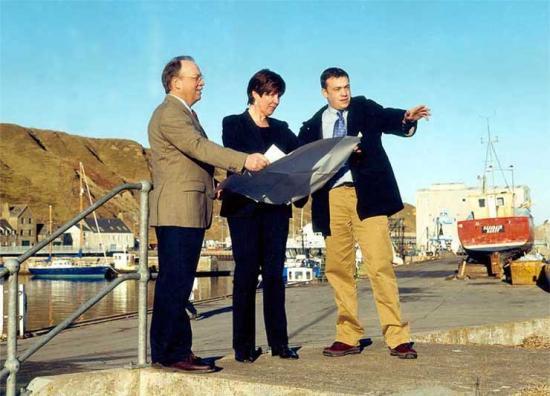£1 Million Fish Grading Factory For Scrabster
25th February 2003

Photo shows: L to R: William Calder (Senior), fish merchant, Annemarie Monteforte, Business Development Manager, CASE and William Calder (Junior), fish merchant.
A new £1 million fish grading and packaging factory is to be built at Scrabster Harbour with funding support from Caithness and Sutherland Enterprise (CASE) and the Scottish Executive Rural Affairs Department.
Scrabster Seafoods Limited has been awarded financial support worth £300,000 from CASE and 3200,000 from the European-funded FIFG Processing and Marketing Grant Awards, towards the costs of construction and for plant and equipment.
The new factory - where fish will be weighed, graded and boxed in accordance to their weight and size - will create at least 14 new full-time jobs in the far north.
The 800 sq.m-bespoke facility is being built to the highest specifications for a food processing plant using highly specialist equipment. It will house a production hall accommodating chill and freezer units, ice machines and facilities for box washing.
Scrabster Seafood's new facility will allow them to change from the traditional method of packaging fish of varying weights and sizes en masse in 60kg boxes. Instead, the company will be able to pack fish according to customers' individual requirements 'adding value' to the product.
Commenting on this major development, William Calder, managing director of Scrabster Seafoods said: "In order for us to compete effectively we have to be able to keep up to date with market trends. Although the British market still tends to prefer fresh fillets of cod and haddock, in Europe the demand is for whole fish such as monkfish, skate and coley. There has also been an upward trend in deep-water species such as black halibuts, blue ling and red fish.
"With people travelling to Europe on holiday more and more, it is likely that we will see an increase in demand for these types of species in the UK over time. Habits are already changing with an ever increasing demand for whole fish as opposed to traditional fillets from UK processors."
Despite the crisis facing the white fish sector, CASE believe the establishment of a state-of-the-art fish grading factory is of strategic importance to the area. Scrabster is the second largest port for white fish landings in Scotland and is now considered the fastest growing port in the UK.
CASE chief executive Carroll Buxton said: "Despite the general trend of declining fish stocks, landings at Scrabster have increased with the port attracting landings from both UK and foreign vessels fishing off the north coast of Scotland. What the port needs now however is a local processing unit to maximise the potential value of the fish being landed at Scrabster.
"Being in a position to improve the presentation of whitefish landings by grading, weighing and packing fresh fish at the port will mean that Scrabster Seafood's new development will help fishermen get a better price for their catch.
"This is also a strategically important project for CASE, meeting with our targets to help companies be globally competitive, improving efficiencies and assisting a business in the food and drink industry, which is a key sector for the Highlands and Islands Enterprise Network and the Scottish Food and Drink Strategy."
Head of Growing Businesses at CASE, Annmarie Montefore said: "This long awaited project demonstrates the partnership approach from two public sector agencies. CASE and SEERAD have worked together in order to ensure that the maximum amount of public funding assistance has been made available to enable the grading and packing factory to proceed."
Related Businesses
Related Articles
